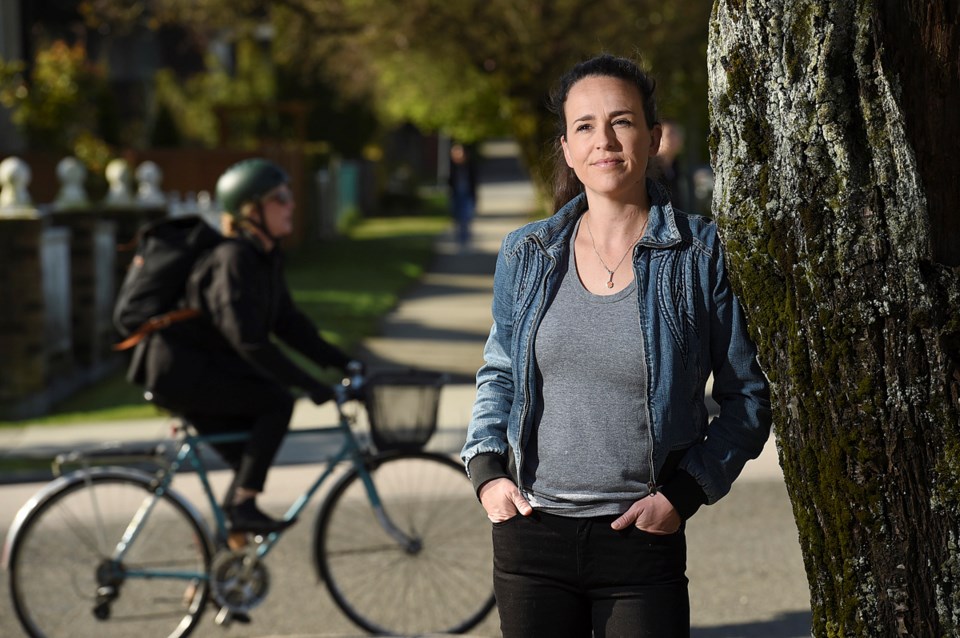Five years after the sudden and accidental death of Van Tech secondary science teacher Amy Hurn, the avid commuter cyclist has been remembered each September with a walk and 20-kilometre bike ride.
The route to Kitsilano and back to the school on East Broadway counted about 80 annual riders and walkers, plus organizers who pulled the whole thing together, including a troupe of Girl Guides as that had been a life-long passion for Hurn.
In addition to family, friends, teachers and her former students — most of them now high school graduates — the caravan recently included several very grateful participants who had a unique connection to the late cyclist.
They were organ recipients. They live today because donors such as Amy Hurn do not.
Hurn was a registered organ donor. After her death in 2012 at the age of 32, the lives of five other people were changed forever because each received an organ or tissue, including her kidneys, liver, lungs, part of her pancreases, and corneas.
“It was so obviously something she would do,” said Briony Lennig, Hurn’s younger sister. “It wasn’t a conversation I’d had with her prior, but her decision came as no surprise. There was part of Amy that was interested in science and she was also so committed to really giving with her work and through extra-curricular and volunteer work. It was how she lived her life.”
The specific recipients of her organs aren’t known to the Hurns but, as a donor family, they play a distinct and sometimes agonizing role in the larger transplant story, one that is not heard as often as the celebratory stories of survival or deep bond between a living donor and recipient.
April 24 through 29 was the national awareness week for organ and tissue donation, a time when BC Transplant promotes the rousing stories of organ recipients and the meaningful sacrifice of families such as the Hurns in an effort to compel people to register as donors.
Registration is simple and is done online in a few minutes at the BC Transplant website. All that is required to register is a provincial health number along with a corresponding name, birth date and address. A guardian must sign for a registered donor under 19.
Last year, 423 organs were donated from both living and deceased donors, a significant rise since 2010 when there were 295 transplants in the province. In 2016, there were 97 deceased donors and 95 living donors in B.C.; the former figure has climbed every year since 2010 when there were 49 deceased donors.
There are more than 600 people in the province currently waiting for a transplant.
Lennig said her late sister might have persuaded people to register by discussing the enormity of existence and the tremendous power of enabling another to live.
“It’s an opportunity to bring some light to a really horrible situation,” she said, noting the public campaign of smiling, cheerful organ recipients does not represent the tragedy her family endured, and yet such public joy was only enabled because of their private heartbreak.
It’s a complex and bittersweet relationship that BC Transplant recognizes and strives to address through donor family recognition and formal support programs.
“I have found it quite difficult this year, missing my sister,” said Lennig. “We were able to give back in a remarkable way. When it feels really dark, there is that.”
Lennig and her parents did receive an anonymous letter of gratitude not long after the transplants. Letters remain confidential by law.
Since her daughter’s death, Sue Hurn found a constructive outlet for her grief. She engaged with BC Transplant and met with health care professionals at St. Paul’s and Vancouver General Hospital to tell them about the experience of the donor family. This month, she will reprise the roll to speak with doctors and nurses at hospitals in Richmond.
“To put a face on the other side, if you like, of this story,” she said. “I put my energy into becoming a part of that because I felt it gave me support.”
Following the accident, she said the help and care of BC Transplant staff was “just amazing.”
“I couldn’t describe what stellar people they are,” she said. “Your emotions are all over the place when you are trying to make decisions and there was always somebody there and somebody to talk to. Because people don’t really get it, which is fine because you don’t want people to get it — that would mean they have experienced it, too.”
The memorial bike ride and walk has also brought the Hurn family a measure of happiness and closure through their mourning, especially as organ recipients take part in honouring the late teacher. A generous scholarship to fund science post-secondary education will continue in the name of Amy Hurn. The final ride happened last fall and, going forward, the family will hold a private memorial picnic in June.
“The conversations have been really powerful, especially when we see the young people who have received organs and are really just living life. It is pretty inspirational,” said Lennig, who is also a registered organ donor.
“Unless you are in that situation, I don’t think you can quite realize how it must feel to be faced with what looks like the end of your life and then be given the gift of life.”
To register as an organ donor, visit transplant.bc.ca.
mstewart@vancourier.com



